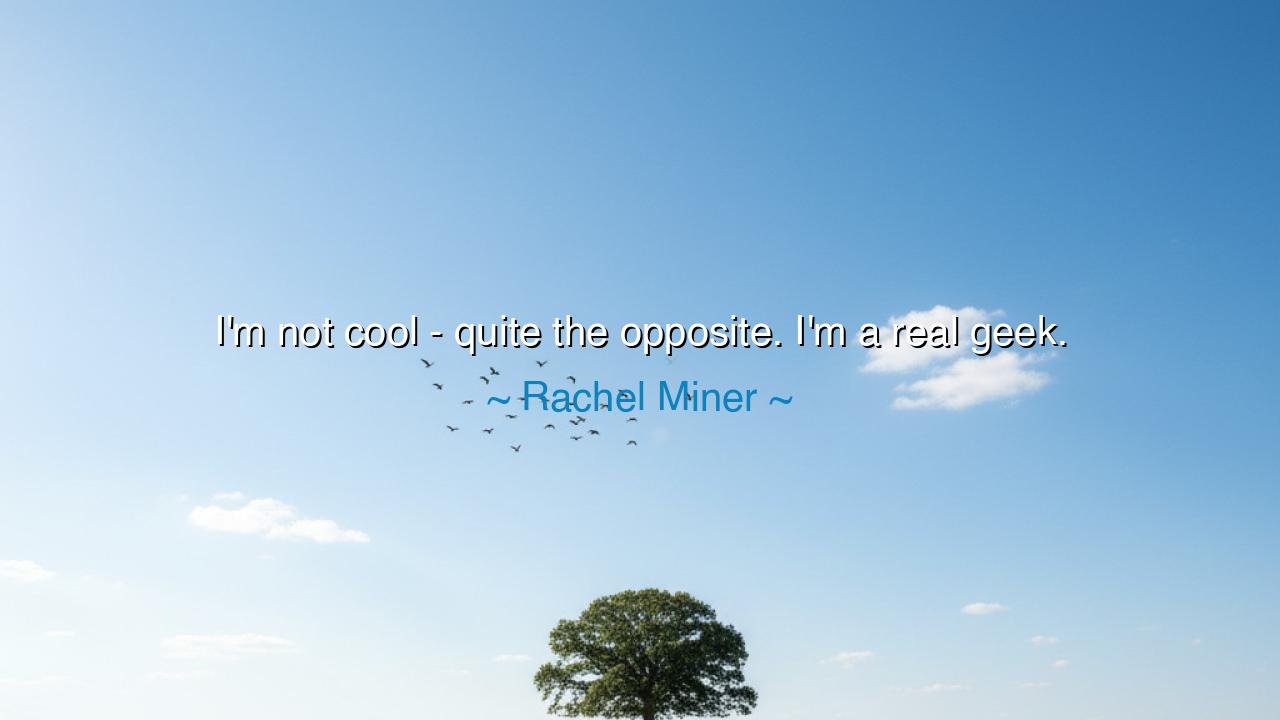
I'm not cool - quite the opposite. I'm a real geek.






Rachel Miner's declaration, "I'm not cool—quite the opposite. I'm a real geek," offers a deeply revealing insight into the nature of self-awareness and the value of authenticity in a world that often prizes superficial qualities like coolness and outward appearance. In admitting that she is not the "cool" figure that society often elevates, Miner embraces the idea that there is profound strength in embracing one’s true self, regardless of how the world defines success or popularity. Her words speak to the human tendency to hide our true nature behind facades, often driven by the desire to belong or to be admired by others, yet it is the honesty of her admission that reveals a deeper, more lasting strength.
This concept of authenticity over societal expectations is not new, and can be traced back to the teachings of the ancient philosophers. Socrates, in his pursuit of wisdom, famously said, "Know thyself," for he believed that true knowledge and wisdom begin with understanding one’s own nature. Socrates was not interested in appearing wise, but in the pursuit of truth—even if that meant being labeled foolish or uncool by others. In his time, the pursuit of wisdom often set him apart from the mainstream thinkers who valued rhetoric and persuasion over true substance. Like Miner, he was unafraid to acknowledge his own flaws and limitations, finding strength not in the mask of “coolness” but in the courage to live authentically.
Consider the example of Albert Einstein, often hailed as one of the greatest minds in human history, yet never concerned with the outward trappings of fame or fashion. Einstein’s eccentricity and unkempt appearance defied the expectations of society, yet it was his relentless pursuit of knowledge that marked his legacy. He never sought to be “cool” in the way that society defines it; instead, his life was devoted to unraveling the mysteries of the universe. His brilliance was not in fitting into conventional molds, but in daring to think differently and remaining true to his own intellectual path, much like Rachel Miner’s admission that she is more concerned with being authentic than with appearing "cool."
The notion that one must conform to societal standards of coolness has often been a trap for many, from the ancient world to the present day. The Roman Empire, for instance, witnessed many who rose to power by adopting the traits of the aristocracy, even if they did not possess the intellectual or moral qualities that true leadership required. Julius Caesar, though celebrated for his military genius and political acumen, also carefully curated his public image, aligning himself with the values of romantic heroism and leadership. Yet, despite his careful image-building, his true strength lay in his strategic thinking and ability to unite people toward a singular purpose—qualities that had nothing to do with the superficial trappings of popularity.
In contrast, Rachel Miner’s embrace of her identity as a "geek" celebrates an authenticity that does not conform to the external pressures of the world. Geeks, in their essence, are often driven by deep passion for something that might seem trivial or irrelevant to others, but it is through this passion that they find their strength. The word "geek" itself has evolved, shedding its negative connotations of social awkwardness to become a badge of honor for those who dare to dive into the depths of specialized knowledge and intense focus. Miner's humble admission reminds us that it is through our unique qualities—those things that make us different—that we can carve our own path to greatness, far removed from the superficial ideals of what it means to be "cool."
The lesson here is powerful: true strength comes not from trying to fit in with society’s often shallow standards, but from embracing who we truly are. Like Socrates and Einstein, Miner reminds us that we do not need to conform to the world’s expectations to find value in ourselves. The world often seeks to measure us by external standards—beauty, popularity, success—but the real measure of our worth lies in our authenticity. When we dare to be ourselves, unencumbered by the fear of not being "cool," we open the door to real fulfillment, the kind that comes from doing what we love, regardless of how the world might perceive it.
In practical terms, we must take Rachel Miner’s example to heart: embrace your inner geek, your passions, and your quirks. Celebrate the things that make you uniquely you—whether they are intellectual pursuits, creative endeavors, or simple pleasures. Do not shrink away from what others may deem uncool or insignificant, for it is in these things that true greatness is often found. Like the ancients who lived boldly and authentically, we too must live without concern for the judgments of others, knowing that our true strength comes from the courage to live our lives as they are meant to be lived—in full authenticity, with passion and purpose.






AAdministratorAdministrator
Welcome, honored guests. Please leave a comment, we will respond soon